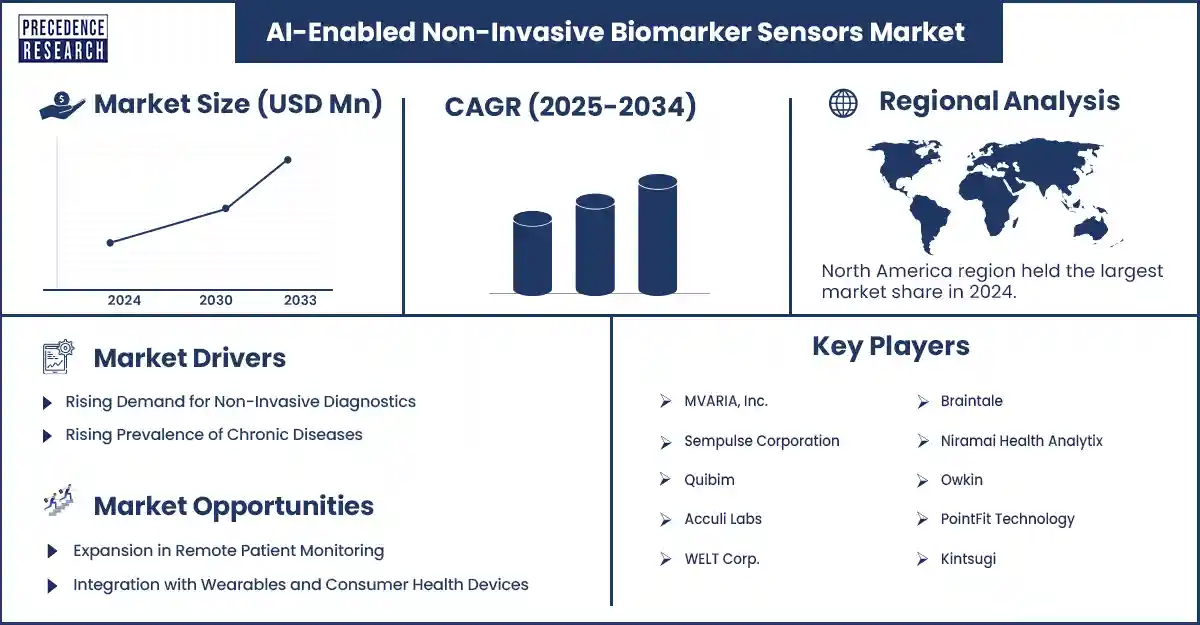AI Enabled Non-Invasive Biomarker Sensors Market and Forecast by 2033
AI Enabled Non-Invasive Biomarker Sensors Market Revenue and Trends 2025 to 2033
The global AI enabled non-Invasive biomarker sensors market is growing with rising demand for advanced, non-invasive health monitoring technologies. This market is expanding due to surging demand for continuous health monitoring, the push toward preventive and precision medicine, and strong investments in wearable and edge AI technologies.

What are AI biomarkers and why are they important?
AI biomarkers play a crucial role in understanding a patient's response to treatments, especially in immunotherapy. They aid in clinical decision-making for cancer treatment, offering insights into disease prognosis and predicting treatment responses. The AI enabled noninvasive biomarker sensors market is growing due to the increasing use of wearable health devices, the rising global burden of chronic diseases like diabetes and obesity, and patient preferences for noninvasive diagnostics. Advances in miniaturized sensors, such as nanostructured plasmonic sensors and flexible electronics, combined with AI/ML algorithms, enable continuous, real-time biomarker analysis outside of traditional clinical settings.
Segment Insights:
- By sensor type, the wearable biosensors segment dominated the market in 2024 due to the increasing consumer demand for continuous, real-time health monitoring in a convenient and comfortable form.
- By biomarker type, the metabolic biomarkers segment dominated the market with the largest share in 2024. This is due to the high prevalence of metabolic disease. Metabolic indicators like glucose and cholesterol are critical for managing widespread conditions such as diabetes and cardiovascular diseases, boosting the need for continuous monitoring through noninvasive sensors.
- By technology, the AI-powered signal processing segment dominated the market because it enhances the accuracy and reliability of sensor data by filtering noise and extracting meaningful patterns.
- By application, the chronic disease management segment dominated the market in 2024 due to the growing prevalence of conditions like diabetes, cardiovascular diseases, and respiratory disorders that require continuous monitoring.
- By end-users, the hospitals & clinics segment dominated the market in 2024, as these healthcare facilities require advanced, accurate, and real-time monitoring tools to improve patient diagnosis and treatment.
Regional Insights:
North America dominated the AI enabled noninvasive biomarker sensors market in 2024, driven by its advanced healthcare infrastructure, widespread adoption of wearable devices, significant R&D investments, and favorable reimbursement policies. The U.S. is a major contributor to the market, boasting a high number of FDA clearances for AI-driven diagnostics and cutting-edge digital health initiatives.
Asia-Pacific is projected to see the most significant growth. This is due to rising healthcare demands, a growing middle-class population, and government initiatives promoting digital health, which are all creating a positive environment. Countries such as China, India, South Korea, and Japan are quickly adopting remote monitoring technologies and fostering local innovation in AI biosensors, which is driving rapid expansion.
AI Enabled Non-Invasive Biomarker Sensors Market Coverage
| Report Attribute | Key Statistics |
| Quantitative Units | Revenue in USD million/billion, Volume in units |
| Largest Market | North America |
| Base Year | 2024 |
| Regions Covered | North America, Europe, Asia-Pacific, Latin America, and Middle East & Africa |
AI-Enabled Non-invasive Biomarker Sensors Market Key players
- IMVARIA, Inc.
- Sempulse Corporation
- Quibim
- Acculi Labs
- WELT Corp.
- Braintale
- Niramai Health Analytix
- Owkin
- PointFit Technology
- Kintsugi
- CranioSense
- Nourica
- The Smart Lollipop
- HealthEntire / KOLIBRI
- Akers Biosciences Inc
Recent Development:
- In May 2024, Sempulse secured FDA 510(k) clearance for its Halo wearable vital signs sensor, enabling continuous, noninvasive vital sign monitoring in both hospital and pre-hospital settings. (Source- https://sempulse.com)
Get this report to explore global market size, share, CAGR, and trends, featuring detailed segmental analysis and an insightful competitive landscape overview @ https://www.precedenceresearch.com/sample/6899
You can place an order or ask any questions, please feel free to contact at sales@precedenceresearch.com |+1 804 441 9344